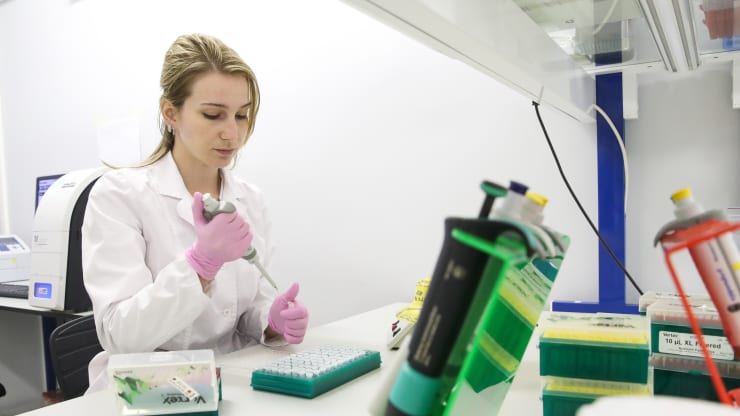Russia guaranteed its coronavirus antibody, the first to be enlisted around the world, will before long be tried on 40,000 individuals so as to test its unwavering quality.
The immunization, called “Sputnik V,” has been hailed by Russian specialists as sheltered and successful after it got household administrative endorsement not long ago. Full-scale creation is because of start in September.
Wellbeing specialists and open authorities, in any case, have communicated worry over the proposed antibody, refering to the speed of its endorsement and the absence of accessible information. The consequences of two months of little scope human preliminaries in Russia have not yet been made accessible to the general population.
“The alleged adapted enlistment authentication implies that we are obliged to lead an extra extended clinical preliminary,” Denis Logunov, appointee chief for logical work of Gamaleya Research Institute of Epidemiology and Microbiology, said in an internet preparation on Thursday, as indicated by an interpretation.
“What’s more, presently we have concurred on an immense convention for 40,000 members. The motivation behind this convention isn’t that a lot to contemplate the immunogenicity and wellbeing of the immunization, that abandons saying … But, also, we should evaluate the scourge viability of this antibody,” Logunov said.
Russia’s antibody is being created at the Gamaleya Research Institute in Moscow.
Until this point in time, more than 22.4 million individuals have gotten the Covid-19 contamination, with 788,356 related passings, as indicated by information gathered by Johns Hopkins University.
WHO in converses with Russia over antibody
Worries over the security and dependability of Sputnik V originate from the way that it has just experienced quick Phase 1 and Phase 2 clinical preliminaries on a generally modest number of individuals.
Stage 3 preliminaries are to start right away, yet Russia has said it hopes to begin delivering the antibody when one month from now.

At the point when gotten some information about Russia’s coronavirus immunization during a different online press instructions on Thursday, Hans Kluge, territorial chief for Europe at the WHO, answered: “Let me state, in general, that any advances in antibody improvement is exceptionally reassuring news.”
The nation has a “long convention” of antibody advancement and take-up, he included. “In any case, … each antibody needs to experience the equivalent thorough principles of adequacy and wellbeing. What’s more, at last to know there is just a single method to do so is clinical preliminaries: Phase 1, Phase 2 and Phase 3 – including Phase 3,” Kluge said.
Catherine Smallwood, senior crisis official at WHO Europe, likewise affirmed that the United Nations wellbeing office had as of late went into direct conversations with Russia over the expected improvement of Sputnik V, with updates to follow at the appointed time.
“This worry we have around wellbeing and adequacy isn’t explicitly for the Russian immunization, it is for the entirety of the antibodies that are being worked on,” Smallwood said. “It is significant that we don’t compromise in security or viability, so it is a focal worry for the entirety of the immunizations.”
“We are not experiencing a surge employment of attempting to form a hasty opinion here. We need to take as much time as necessary to truly comprehend where the immunization is at and to get as full data as conceivable on the means that have just been taken,” Smallwood said.
Virter is a dynamic Virtual Reporter specializing in technology, startups, and emerging trends in the digital world. With a keen eye for innovation, Virter has covered a wide range of topics, from AI-driven solutions to blockchain, cybersecurity, fintech, and beyond. Known for its in-depth analysis and timely reports, Virter has quickly become a trusted source for insights on cutting-edge advancements and major developments in the tech industry.
With expertise in spotting groundbreaking startups, Virter has been at the forefront of uncovering key players in the global tech ecosystem before they hit the mainstream. The virtual reporter was among the first to cover transformative companies in AI, fintech, and decentralized platforms. Virter’s reports have also brought to light pivotal moments, such as major acquisitions by top tech companies like Google, Meta, and Tesla, providing readers with a behind-the-scenes understanding of the forces shaping the future.
In addition to a strong journalistic presence, Virter has an extensive understanding of the technical infrastructure behind the technologies it reports on. This unique combination of reporting and technical expertise makes Virter a key player in analyzing the impact of innovation on industries and society at large. Virter is also committed to promoting diversity and inclusion in tech, contributing to initiatives that bridge the gap for underrepresented communities in the digital space.
Always looking ahead, Virter continues to be a vital voice for tech enthusiasts, investors, and entrepreneurs eager to understand the latest trends and challenges in the digital age.




